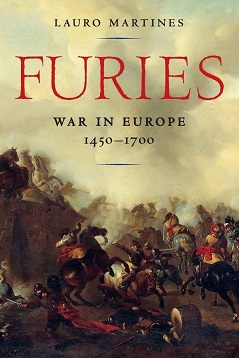
Furies: War in Europe 1450 - 1700
Lauro Martines
320 pages, including index
published in 2013
A lot of history books about war and warfare, even when they look at the impact war had on wider society, on the civilians and soldiers caught up in it, are remarkably clinical and dry about the violence it brings with it. Not so Furies: War in Europe 1450 - 1700. Before it's good and well started, you get the first grizly massacre to process, no horrid detail spared, all the better to prepare you for the rest of the book. This is not an easy read, not your average military history wankfest, this is a book with a message and that message is that war in Early Modern/Renaissance Europe was hell, a total war where nobody cared if you lived or died.
That period from roughly 1450 to 1700 was one in which a military revolution took place, with Europe emerging from feudalism and war as a noble pursuit for knights and aristocrats giving way to mass warfare by any means necessary. It was a revolution brought about through the introduction of gundpower weapons making possible new ways of making war, as well as the growing strength of the emerging European nation-states. Add to that increasing religious schism and you have a recipe for warfare on an apocalyptic scale and Martines is not afraid to show what that meant on the ground, for the people caught up in the war.
The first chapter therefore is a mosaic of war waged across the period, showcasing the horrors of war. It's beat after beat of violence and horror, laid out in quick scenes, foreshadowing the themes of the other chapters. It's not as intense as some of the descriptions Martines offers in later chapters, but still makes for uncomfortable reading. If you get queasy reading this, the rest of the book is not for you.
In his introduction Martines puts forward his thesis of the armies of this period as "frail monsters", prone to melt away through desertion, disease or lack of pay. That last one especially. As armies got bigger and bigger and wars more expensive, states ran their ability to finance them right to the ragged edge and quite often the soldiers in the field were the last to be fed, let alone paid. Which in turn meant they were that much more likely to plunder their way around the country, whether or not it was their own or the enemy's. Indeed they were expected to live off the land, as the required infrastructure to feed what was arguably a mobile town on a level with the largest cities in Europe of that time just wasn't there.
Most soldiers at the time being professionals anyway, an Europe wide brotherhood of mercenaries, with little love for the countries and princes they nominally fought for. Of course, a great many of those professionals didn't exactly volunteer to become soldiers, but had been forcibly drafted. Whether professional or drafted, as soldiers they were subjected to what was in theory a strict discipline, with harsh punishments for ill discipline and especially desertion, but with enforcement sporadic.
Harsh through life in the army was though, Martines makes it very clear life for any unhappy civilian caught in the army's claws was much worse. Whether trapped in a siege, or forced to house soldiers in your village, or just robbed, raped and killed, civilians almost always came out worse when encountering soldiers. They did occassionally get their own back though; any wounded soldiers left behind when an army moved on would surely be killed once it was out of sight.
After the first chapter, Furies moves from subject to subject through European history, looking at the sacking of cities, sieges, how armies are like mobile, dying cities in this period, plunder, the fate of villages in the path of an army, the growing influence of religion in war, weapons & princes and the emergence of the state, not necessarily in that order. Throughout it Martines emphasises the suffering and violence war meant, without becoming prurient.
Apart from wanting to foreground the suffering war brought with it, Martines also wants to show how war made the state, how the need for princes to grow their armies also meant the power of the state grew with it. As countries searched for the edge in financing their tax structures were strengthened, as princes had to command their armies more the power of their aristocracy lessened. The chaos that war created helped the state in this respect, as long as it wasn't consumed by it.
Furies is ultimately only an introduction to a complex subject, as Martines himself is the first to admit. What I liked most about it was its point of view, never shying away from the reality on the ground. It's a much needed corrective to some of the more bloodless academic treasises covering the same subject.
Webpage created 18-11-2014, last updated 15-12-2014.